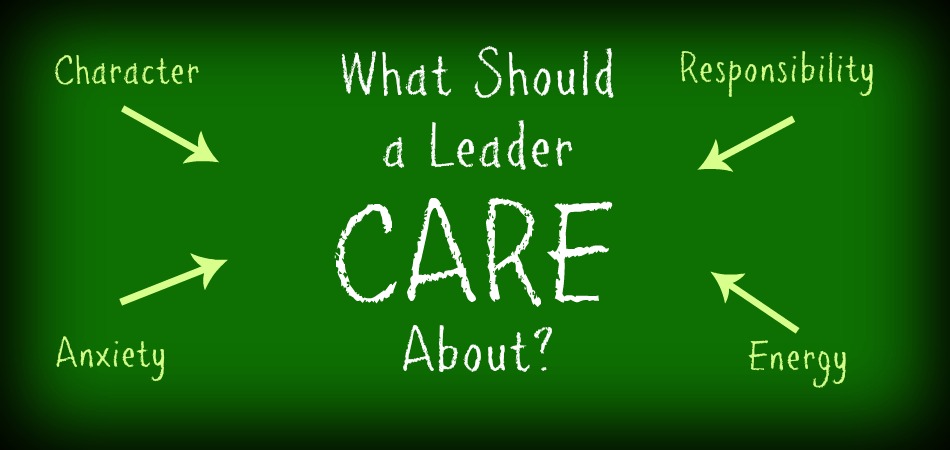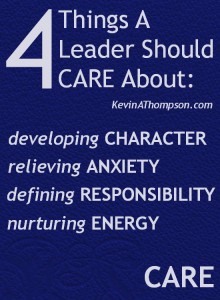One of the great struggles I have as a leader is determining what I should do. What gets my time and attention?
I know what I want to do—everything. I want to be involved in everything, do everything, decide everything. Most leaders I know are tempted toward a corporate ADHD where every problem or opportunity that arises tempts the leader to drop everything and tackle that issue.
Of course the only problem with this is that a leader would never get anything done with that mentality. While a leader wants to do everything, we only have the time to do a few things.
But what things?
What should a leader do?
When I think about leadership—whether in the church I lead or my family or my personal life—I give attention to four specific areas.
1. Character. The character development of an organization cannot be delegated. It must be the focus of the top leaders. From family to business, leadership determines the character of an organization. While a leader cannot define what happens in one moment from one employee, we can determine how we respond and we can determine what is accepted or not accepted in any given organization. (See: Sometimes You Can Only Wear One Hat)
It’s a leaders job to create an organization with high character. We are the ones who determine if we value truth, humility, honor, hard work, honesty, kindness, the dignity of others, and a whole host of other issues. Whether we encourage bad behavior or simply tolerate it because of apathy, we are the ones enabling the activity.
Nothing communicates the importance of character more than when a leader makes it clear by word and example that she will not tolerate a weakness in corporate culture. When the leader makes character a top priority, employees quickly understand its importance. Those who posses a high character will get on board; those who prefer questionable tactics will jump ship. Both ways, the character of the organization will be enhanced.
2. Anxiety. Few people realize the power anxiety has over our lives—both individually and corporately. Most bad behaviors are a result of fear. We fail to recognize it, process it, and respond properly to it. When we fail to deal with our anxieties, our anxieties end up dealing with us. Rarely is this a good thing. (See: Do You Have This Symptom of Anxiety?)
One aspect of a leader’s job is to recognize the potential anxieties which might be felt and to put them in their proper context. Not all fear is bad. Yet humanity has a very poor ability to recognize what should be feared and what should not be feared. We are often afraid of the wrong things.
Anxiety rules many families, workplaces, and churches. When leaders are ignorant of or willfully ignore the anxieties of the people they lead, bad outcomes are certain. Overly anxious communities are unable to make wise choices, often blame others, are quick to make excuses, and fail to take personal responsibility. (See: I Know Who Is In Charge of Your Family)
Even if a leader can’t remove an anxiety, recognizing the anxiety and having compassion toward it builds the credibility of the leader and empowers others to work through their fear.
3. Responsibility. A leader can’t do everything, but they are in charge of making sure everything gets done. A leader defines what gets done and who does it. Defining responsibilities and communicating those responsibilities is near the top of every leader’s to-do list. (See: Never Hire Someone Who Blames the Umpire)
Within these responsibilities, a leader must determine what she will do and what will be delegated to others. The temptation for many leaders is to empower others to do what they do best and then for the leader to take care of what is left. It might feel counterintuitive, but a better procedure is for the leader to determine what she does best, and then delegate everything else to others. The former tempts the leader to hire people just like her so they can do what she does well. The latter encourages the leader to hire people different from her so they can be strong in her areas of weakness.
Anytime something doesn’t go as a leader had hoped, their first question should be whether or not they have clearly defined what should be done and who should do it. The second question a leader should evaluate is whether or not they themselves are modeling responsibility. Many leaders complain about others but they are failing to do what is their responsibility. (See: We Are Happy with our Decision, Thank You)
4. Energy. No matter how well we have defined what gets done and who does it, we need the energy to accomplish the task. I agree with Jim Loehr and Tony Schwartz in their book The Power of Full Engagement when they say energy management is more important than time management.
Energy doesn’t just happen. It is created, planned for, and managed. Character can be formed, anxieties confronted, and responsibilities defined, but show me an individual or group that doesn’t have energy and I’ll show you someone who won’t get much done. Energy is vital to accomplishing whatever task we seek to accomplish.
It is often the unspoken and unnoticed magnet which unifies a team. Without energy, everything becomes more difficult. Many character flaws are a failure of energy. Anxiety zaps energy. A failure to communicate responsibility will erode energy. The leader who ignores energy does so at their own peril.
Four broad categories define what I think a leader should do. These are the things a leader should truly C.A.R.E. about. When we develop character, relieve anxiety, define responsibility, and nurture energy, we can accomplish great things. When we ignore any of the four, trouble is on the horizon.
What do you think deserves the most of a leader’s attention?





3 Responses to What Should a Leader CARE About?